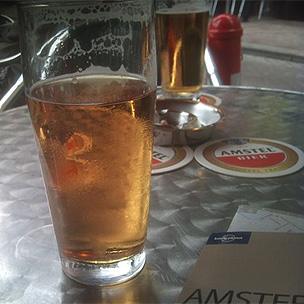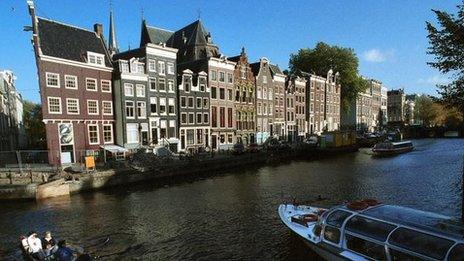Amsterdam copies Cardiff's approach to reducing violence
- Published

Cardiff's approaches to violence, alcohol and late-night safety are being adopted in Amsterdam
The Dutch capital Amsterdam is following in the footsteps of Cardiff in a bid to reduce violent behaviour.
It is adopting a Cardiff University professor's approach which he says has made the Welsh capital safer than similar sized UK cities.
It works by using information from victims to identify violence hotspots, such as in nightclubs and parks.
The method has already been adopted by Western Cape in South Africa and Milwaukee in the USA.
The man behind it, Professor Jonathan Shepherd of Cardiff University's School of Dentistry, said there was no reason it could not work anywhere in the world.
One of the most significant breakthroughs was the sharing of information and joint action by police, councils and emergency departments to try to curb violence.
Every time someone comes through accident and emergency with any sort of injury where alcohol is a contributory factor the police are informed.
Late-night safety
It is claimed that the approach has reduced hospital admissions for violence by 42% in Cardiff, relative to 13 similar cities in Wales and England.
More than 100 hospitals across Wales and England have since copied Cardiff.
"It's very low tech and the basic requirements are that the police and local government and health meet from time to time in an organised way," Prof Shepherd said.
"That's not rocket science, so we think this is applicable widely, including poor countries [and] low and middle income countries.
"We would very much like to see this implemented in a country like Nigeria, Uganda or South American countries where there's a lot of violence.
"It's in the World Health Organisation-recommended approach but it's easier said than done."
Prof Shepherd, who was a surgeon at Cardiff's University Hospital of Wales, started his work in 1996 after realising that a great deal of violence which resulted in hospital treatment was not known to the police because victims did not report it.
He also noticed trends in the types of facial injuries he was treating.
Facial injuries
Patients were being regularly admitted who had been glassed, and one early success was putting pressure on clubs and city centre pubs to adopt plastic glasses.
The move brought about an immediate decline in facial injuries connected to alcohol.
However, there were continuing problems with drink-related crimes in the city so Prof Shepherd and his violence and society research group continued their innovative approach.

A delegation from Amsterdam visited Cardiff to learn lessons
The research group's research into violence, alcohol and late-night safety was recognised with a Queen's Anniversary Prize for excellence in higher education in 2009.
Amsterdam decided to adopt the approach after a delegation from the city, including the chief inspector of the police force, visited Cardiff last year.
Hidde Toet, from the Dutch Consumer Safety Institute and who led the delegation, said after the visit: "The Cardiff model provides us with an effective method to improve the way we share information and implement preventative measures by police and local government to effectively reduce violence."
- Published4 September 2012
- Published18 April 2012
- Published4 April 2012
- Published23 March 2012